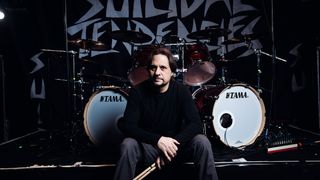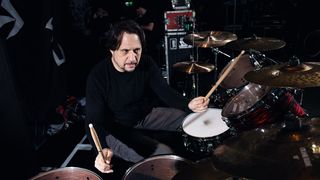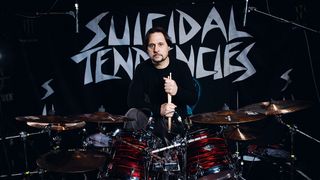Dave Lombardo on Suicidal Tendencies, Disney and seeking the perfect improvisation
Plus much more from the trailblazing drummer

"I really like having tours without any days off"
Drummers have a habit of being pigeon-holed early in their careers, forever labelled as a funk drummer, jazz drummer, rock drummer, etc, but Dave Lombardo has steadfastly defied any and all attempts to put him in a musical box.
With Slayer in the 1980s he raised the bar for metal players everywhere with his furious double-kick playing, which wrote the blueprint for death metal.
Lombardo has been a member of Faith No More frontman Mike Patton’s avant-garde group Fantomas, played alongside experimental saxophonist John Zorn, appeared on film soundtracks, including the Chinese box office smash hit The Monkey King, and performed movie scores with composer Christopher Young and a 75-piece orchestra. He’s even worked on the music for a Disney pilot!
In 2016 he toured with punk icons The Misfits and accepted Mike Muir’s invitation to join thrash-punk crossover legends Suicidal Tendencies.
“A lot of the music brings back really good memories,” says Lombardo, who first saw Suicidal perform at The Concert Factory in Los Angeles in 1982 and who used to blast out their track Subliminal in the Slayer tour van. Decades later, the drummer’s presence in the line-up and on their album World Gone Mad has helped power a resurgence of interest in Suicidal Tendencies.
On top of that, he’s working on the debut album from his new hardcore supergroup Dead Cross, featuring bassist Justin Pearson from The Locust, guitarist Mike Crain from The Festival Of Dead Deer and Mike Patton on vocals. When Lombardo promises their music will be “angrier, faster, than anything else I’ve done before”, you know it’s going to be intense stuff.
How is the World Gone Mad tour going?
“It’s been amazing. I really like having tours without any days off. It builds up your stamina, gets you strong again after a couple of months of winter hibernation, so this has definitely been good at least for me physically and for the band as well because there seems to be a new interest in Suicidal.”
Who’s coming to the shows? Older fans returning to the band? New fans?
“I don’t know. The new album is very strong. Mike is an amazing songwriter and I really like the music, I love playing with the band so maybe that energy is transcending to the public and they’re seeing how much fun we’re having, we’re enjoying ourselves and keeping the music to its original style, which was my intention, to make sure that we perform the music like it was originally recorded without any added bits.”
The new album is very strong. Mike is an amazing songwriter and I really like the music, I love playing with the band so maybe that energy is transcending to the public and they’re seeing how much fun we’re having
But presumably when Mike Muir called you for this gig, he wanted you to be you?
“Yeah, I mean I throw my chaos in there. Believe me, I can’t help that but what I do is stay true to the original rhythms, the original beats and parts because apparently what I heard is there were some drummers in the past that didn’t, they were changing things around and it wasn’t conducive to the band and what they originally were. I’m pretty happy, Mike is happy, too, everybody is electrified in a way. I just do what I do, I don’t plan on it, if it works, it’s great. Sometimes it might not work but for the most part it’s been positive ever since I’ve been in the band - now it’s been a year. It’s been really good.”
Last year you were the guest drummer on Late Night With Seth Meyers. How was that?
“That’s a whole different animal. It was four days. We go in at noon into this little studio, I’m on a little electronic drumset, we talk about the different guests that are coming on and we create songs for each of the guests and some of the commercial breaks. We write music and then we perform it that evening. What’s challenging was as I’m playing I had to keep an eye on the stage manager, he’ll tell me when to wrap up the songs: ‘Okay, you’ve got five seconds - four, three, two, one…’ and I had to end the song, do a roll, boom. ‘Welcome, ladies and gentlemen, tonight we have…’
“Then a guest would walk out and I would have to end the song right when the guest sits down, so I have to watch them. Sometimes they’ll do a little dance, sometimes they’ll give Seth a longer hug and we keep playing until I see that person sitting down, then we end. There were some challenging parts but it was a lot of fun. I was going to work at NBC every day for four days. It was awesome.”
Did they give you any direction at all about the music?
“No. Let’s say for example there was one guest, he’s the actor in the Assassin’s Creed movie and so we go okay, how are we going to do this? Let’s make it moody and doom! So I said, ‘Okay, how about a beat like this? Thematic, cinema-like drum beat.’ Oh, that’s great. We would write music like that to each guest.”

Lombardo does Disney
Is film and TV work a growing part of your career? You played on the soundtrack to Insidious 3 and you worked on the music for a pilot for Disney?
“Yeah, I got offered to do a pilot for a Disney cartoon. The cartoon was only 11 minutes but there were probably eight to 10 different genres within those 11 minutes. There was ambient, African percussion, reggae, blues, rock, so there were many different genres that we had to tap into to fit each scene. The cartoon didn’t make it but the experience was worth its weight in gold.
“You have to report to the producer of the show, they give you ideas, you give them a first draft, you have a meeting then they come back, ‘I like this and that but remove this.’ Then we have to go back and re-do it again. There were probably 10, 12 different meetings we had to have to go back and forth, which is similar to what movie composers go through.
"They have to sit with the producers and directors and they have to get all this input from them to get a visual of what they want as far as the music is concerned. I love doing all that stuff. It’s a challenge, it’s new and it just adds to your music education and your experience, which you can’t really get in a classroom.”
When terrorism hit home in places where I work, I got p**sed. These are places where I could have been onstage, places where journalists that are my friends, I don’t know if they’re alive until I play Paris again
How did Mike Patton come to get involved with Dead Cross?
“We were toying around with some ideas for vocalists and we just didn’t know where to go. My manager was like, ‘Call your friend.’ ‘No, no.’ ‘Dave, call your friend.’ ‘Ah, he’s not going to want to do it, he’s busy with all kinds of other stuff.’ ‘You need to call him.’ ‘Ah, yeah, I’m thinking about it,’ and then she finally got me, ‘Okay, I’ll text him,’ because I don’t like bothering him. My usual text, ‘Hey brother, what’s happening? Check it out, this is my situation.’
"He had found out I was working with Justin and Mike and they’ve released several albums on [Patton’s record label] Ipecac, so he knows those guys. They’re hardcore, underground, do-it-yourself guys that don’t really listen to anyone else but their own direction. I told him my situation, he said, ‘Absolutely!’ I was like, what?! I couldn’t believe it.
"He goes, ‘Yeah, I’d love to hear what you guys are doing.’ And he told me that he’s really excited to be working again with me. I am too. He’s finished all the vocals and right now, we’re probably on the sixth or seventh song out of 10 mixed. It’ll be done soon. We’ve already looked at artwork. It’s exciting. I can’t wait for people to hear it because it’s more brutal, more hardcore, I play faster and harder than on any album I’ve done before.
"This is 10 songs, 27 minutes and it’s blast beats, it takes my playing somewhere else. I’m excited for people to hear it because they’re not going to believe it.”
Was that part of the appeal, to really push the limits of your playing?
“It was a combination of things. It was a mix of what happened with Philm [Lombardo’s previous band who split up suddenly], which pissed me off, and the Bataclan shootings.
"When terrorism hit home in places where I work, I got p**sed. These are places where I could have been onstage, places where journalists that are my friends, I don’t know if they’re alive until I play Paris again. I don’t know who’s not around anymore, so that just really p**sed me off.
"I did an interview shortly following that shooting and I said, ‘There is no time for We Are The World bulls**t, it’s time for f**king punk.’ So here we are. It’s that anger around everything that’s happening in the world today. That’s what fuelled this album for me.”
Will you be able to tour the album?
“I believe so. I couldn’t tell you when. We’re going to let the horse out first, which is the album, and then think about what happens later, at least that’s what Mike is saying; let’s just wait and see and if he has time and if I have time as well. We’ll see.
"I have some great people, better than ever, working for me. The Suicidal camp is fully knowledgeable and respectful of my schedule, if I need time for something they cooperate. I think it’s a win-win situation for me now. It’s awesome. I’m really happy.”

On the road again
What’s next for you? More touring?
“Yeah definitely more. I want to continue touring with Suicidal. We end this tour then we have three weeks off and then we do a US tour, then I fly to Paris and I do a show with John Zorn at the Louvre, at the Museum, playing in the glass pyramid. Three-piece drumset, saxophone, just improvising. We’re playing two shows then Suicidal starts their tour in Paris and we do a little run in France and Spain. I’m really excited about that run because of working with John Zorn.
“Working with Zorn is like a musical mental cleansing. I need it every now and again. I met up with him when I was in New York City doing the Seth Meyer show, we had lunch, I told him how much I missed jamming with him. A few weeks later I receive, ‘Hey, do you want to do Paris with me?’ I said, ‘Yeah, let’s do it!’ I performed with him at Los Angeles Museum of Contemporary Art and we played the Royce Hall at UCLA. It was Zorn, Bill Laswell on bass and myself.
“We did an improvisation, we did 45 minutes. I think he’s doing something similar at the museum in Paris. What he does is he writes music for the different rooms, say for Monet or Jackson Pollock. When we performed in LA, Zorn and I performed in the Jackson Pollock room, it’s abstract, which was fitting for our performance which is all improvisation.”
Does he give you any indication beforehand what he wants to play?
“No, nothing. They’re the most nerve-wracking shows you could ever be a part of because you never know how it goes and that’s the exciting part of it and that’s why I call it a musical mental cleansing. We can do anything we want, I can play any beat I want. I can start with a blast beat or I can go into a groove, real slow, 90 beats-per-minute funky beat. It’s whatever we want.
"When we did the John Zorn, Bill Laswell, it’s called BladeRunner, we would say, ‘Okay, who starts?’ We look at each other, ‘Let’s have Bill start.’ Or ‘Why don’t we all start? Just click four and let’s go.’ Okay! I click my sticks in the most random tempo and then it just goes off. I love it.
“You’d think with something that’s just improv it would be easy but I want it to be perfect - a perfect improvisation. I don’t know what that consists of but one knows when it feels right.”
I want to continue touring with Suicidal. We end this tour then we have three weeks off and then we do a US tour, then I fly to Paris and I do a show with John Zorn at the Louvre
It’s interesting to see more drummers building their own brands. You’ve got your art projects, your own T-shirts…?
“All that stuff was the idea of my manager. ‘You need to do this, you need to brand yourself,’ just laying it out. She’s been working hard on that and I think it is important, but at what stage is that important? I’ve waited all the way up to last year to have a website, to have T-shirts. I’ve always relied on buying bootlegs, ‘Oh look, a T-shirt of me, let’s buy it!’”
You bought your own bootleg shirt?
"Yeah! ‘Dave Lombardo For President’ - I bought it!”
What about The Repercussion Of Dave Lombardo?
“The drum clinic workshop? That’s my manager again. She comes up with some interesting viewpoints, like the whole Misfits thing. Everyone was pleased with the drumming, everything felt really good, the band was really excited and then she turns around and says, ‘There you go, it’s the Repercussion Of Dave Lombardo.’ Suicidal, everyone is like, ‘Damn dude, it’s powerful.’ I’m not saying it because I’m not like that, she’s the one saying, ‘That’s what happens when people work with you.’ I don’t know what it is, it’s just my style or my attack, my approach, my energy, it’s just what I do.
“That’s how we got the name for it, The Repercussion Of Dave Lombardo, it’s a little drum clinic workshop I did in Australia but who knows, it might become a book one day. It could be a bunch of things, including maybe a solo album - but not music, it will be drums, more cinematic. It will probably be influenced by Tito Puente and some of his work. Top Percussion is a very influential album to me and what he did as far as drum compositions that are just drum songs. I’ve had drum music worked out now for years and maybe one day I’ll release that.
“I’ll re-record it because an artist is never happy. I listen to it now, I did that 15 years ago, I could make that better! I have them all catalogued, all ready to go, I just have to book some time in the studio with a bunch of drums and just start recording.”
Are you keen to bring out the Latin side of your drumming? Maybe play with a conguero and a timbales player, like Tito Puente?
“Yeah! There will be a time for that. I did that once for a Guitar Center performance. They have a drum contest and I was invited to put together a performance and I put together two percussionists - congas and a timbales player - and we performed a Los Chicanos song. It’s a Latin song but we sped it up and made it a little heavier. I’ve tapped into that but maybe in the future I’ll do something like that. I don’t leave any doors closed.”

MusicRadar is the number one website for music-makers of all kinds, be they guitarists, drummers, keyboard players, DJs or producers...
- GEAR: We help musicians find the best gear with top-ranking gear round-ups and high-quality, authoritative reviews by a wide team of highly experienced experts.
- TIPS: We also provide tuition, from bite-sized tips to advanced work-outs and guidance from recognised musicians and stars.
- STARS: We talk to musicians and stars about their creative processes, and the nuts and bolts of their gear and technique. We give fans an insight into the craft of music-making that no other music website can.

"Anybody who thinks they can do exactly the same thing they did 50 years ago is mad": Deep Purple's Ian Paice and others on the demands of playing drums in your 60s and 70s

"It was a fair fight that I got thrown out of the band for, because Moon came for me with a tambourine": When Roger Daltrey was fired from The Who at the worst possible time in 1965

"Anybody who thinks they can do exactly the same thing they did 50 years ago is mad": Deep Purple's Ian Paice and others on the demands of playing drums in your 60s and 70s

"It was a fair fight that I got thrown out of the band for, because Moon came for me with a tambourine": When Roger Daltrey was fired from The Who at the worst possible time in 1965
Most Popular







